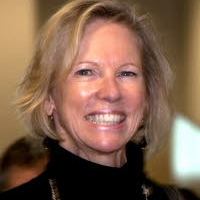 Kathy Bushkin Calvin, 60, is the Chief Executive Officer of the United Nations Foundation.
Kathy Bushkin Calvin, 60, is the Chief Executive Officer of the United Nations Foundation.
Among the UN Foundation’s priorities are decreasing child mortality, empowering women and girls, and protecting diverse cultures and environments.
Here, she speaks to Meg Pier about how travel can inspire the desire to make a difference and why even sustainable tourism can be a double-edged sword for local communities.
Meg Pier: The UN Foundation is described as a platform for connecting people, ideas and resources to help the United Nations solve global problems. Can you give me a couple of concrete examples of how such connections successfully solved specific problems, on both an organizational and individual level?
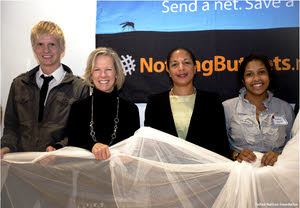 Kathy Calvin: A favorite example is from our “Nothing but Nets” campaign to help end malaria. It started with the power of one person, a Sports Illustrated columnist, who saw a documentary about how malaria kills 300,000 children a year—yet it has been eradicated in the U.S.
Kathy Calvin: A favorite example is from our “Nothing but Nets” campaign to help end malaria. It started with the power of one person, a Sports Illustrated columnist, who saw a documentary about how malaria kills 300,000 children a year—yet it has been eradicated in the U.S.
He challenged his readers to join him in helping end malaria by sending $10 to send a net and save a life. He turned to us because we had a successful program of delivering bed nets along with measles vaccinations. When he raised $75,000 overnight, we knew there had to be lots of people waiting to be given a chance to help, so we created the campaign, using the name of his column.
Travel and give back: Dr. Bernard Salome & the MassiveGood Campaign
It has since raised more than $30 million from over 120,000 people, mostly in small donations and many from young people. Our star performer is an eight-year-old girl from Pennsylvania who has raised more than $100,000 at her school and church, but the campaign also connects Lutherans and Methodists, fans of the National Basketball Association and Major League Soccer, the Boy Scouts and others.
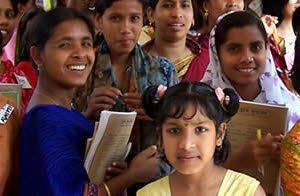 Another example is our campaign to connect “tween” girls in this country with their counterparts around the world. Called “Girl Up: Uniting Girls to Change the World,” it gives them the chance to learn, get involved and give, and funds support UN programs for adolescent girls.
Another example is our campaign to connect “tween” girls in this country with their counterparts around the world. Called “Girl Up: Uniting Girls to Change the World,” it gives them the chance to learn, get involved and give, and funds support UN programs for adolescent girls.
MP: You must travel extensively in your work for the UN Foundation—could you describe trips that were particularly eye-opening, and share what the “lesson” was, either about others, or yourself?
KC: I am fortunate that I have been able to see the UN’s work on the ground. I was in Haiti in mid-February, just a month after the massive earthquake leveled most of Port au Prince. It was heartbreaking to see the devastation, the loss of life, the living conditions, and the desperation.
More Pier to Peer: Global Heritage Fund Founder Talks Sustainable Tourism
But there was hope among the heartbreak. The Haitians have a remarkable resilience.
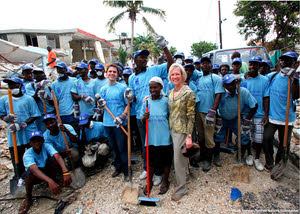 The market was already up and running, shoes were being shined, and food was being sold. The UN people were remarkable as well: their building was demolished and more than 100 of their colleagues and families died, but they were working around the clock, sleeping between the fax machine and the computer, helping deliver food, tents, latrines, and peace.
The market was already up and running, shoes were being shined, and food was being sold. The UN people were remarkable as well: their building was demolished and more than 100 of their colleagues and families died, but they were working around the clock, sleeping between the fax machine and the computer, helping deliver food, tents, latrines, and peace.
Three years ago, at the beginning of our malaria work, I visited Senegal, a country where the death toll has been quite high. But the Senegalese were taking charge of educating themselves about how malaria is spread, demanding bed nets and teaching others how to use them. We visited several villages where there was no school or health facility, but the nets were getting delivered and used.
I learned that poor people are by and large smarter than most of us. They have to be resourceful, persistent and collaborative to survive. I found that I was not sure I could do half as well.
More: Volunteer Vacations & Disaster Assistance in Haiti, Chile & Beyond
MP: I find that expectations—of myself or others—can sometimes create misunderstandings. One of the reasons I love to travel is that it causes me to challenge my expectations. You must find yourself in all kinds of different situations. Can you speak to your experience with “expectations?”
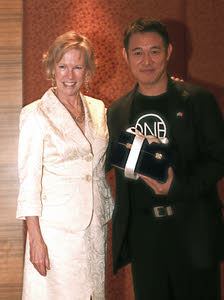 KC: I found my recent trip to China challenged just about everything I thought I knew. We took the UN Foundation Board there in the fall of 2009, and I took some private vacation time as well. I was amazed how China is both the past and the future simultaneously and that it is absolutely charting a course ahead without regard to the U.S. as a major super power. The people were friendly, ambitious, complex, and numerous!
KC: I found my recent trip to China challenged just about everything I thought I knew. We took the UN Foundation Board there in the fall of 2009, and I took some private vacation time as well. I was amazed how China is both the past and the future simultaneously and that it is absolutely charting a course ahead without regard to the U.S. as a major super power. The people were friendly, ambitious, complex, and numerous!
I thought this was going to be my one and only trip to China in my lifetime, but after two weeks, I was convinced I’d need to return many times to understand it and our own future.
I was intrigued how the Cultural Revolution 30 years ago is shaping the next generation of Chinese leadership. Although Mao is still revered in ways that surprise us in the West—even though most of his views have been rejected—the experience left people in their 40s to 60s with experiences not unlike the effect of the Great Depression in this country. We also learned the next generation of leaders will be lawyers and the like—not technocrats and engineers. Their modernism and ability to see the future —and their role in it—was astonishing. America needs to pay attention.
More Pier to Peer: Hitesh Mehta – Interview with an Eco-Tourism Pioneer
MP: I understand that at the 2009 Clinton Global Initiative, H.E. Khalid Abdalrazaq Al-Nafisee made a $30 million commitment from the Kingdom of Saudi Arabia to polio eradication. This contribution will go towards vaccinations, education and awareness for eliminating polio worldwide. In addition to the important financial commitment, Saudi Arabia, the Keeper of the Two Holy Mosques, is also requiring every pilgrim entering the Kingdom for the Hajj, the annual pilgrimage to Mecca, to receive a polio vaccination. Have you traveled at all to the Middle East and, if so, could you describe an experience that best illustrates what you learned there?
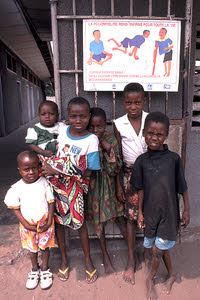 KC: The Kingdom’s decision on the Hajj was made several years ago before their recent gift to combat polio in the four Muslim-prevalent, polio-endemic countries. It was a major breakthrough to prevent the spread of polio from the pilgrims to each other. I have been in Israel, Palestine and Jordan, where we took the UN Foundation Board in 2007. The notion that three religions are fighting over a fairly barren piece of land seems amazing. The cultural richness of that region is stunning. From Petra in Jordan to the biblical and political trail throughout the whole region, you can’t get enough in a week. It’s definitely on my “return” list.
KC: The Kingdom’s decision on the Hajj was made several years ago before their recent gift to combat polio in the four Muslim-prevalent, polio-endemic countries. It was a major breakthrough to prevent the spread of polio from the pilgrims to each other. I have been in Israel, Palestine and Jordan, where we took the UN Foundation Board in 2007. The notion that three religions are fighting over a fairly barren piece of land seems amazing. The cultural richness of that region is stunning. From Petra in Jordan to the biblical and political trail throughout the whole region, you can’t get enough in a week. It’s definitely on my “return” list.
MP: I know that sustainable development is a priority for the UN Foundation, focusing on promoting sustainable tourism, community-based enterprises, and promoting market access. Can you describe a trip you took in relation to this priority, where you saw one of these three “legs” making a meaningful difference in someone’s life, or in the life of a community?
Learn more: Global Heritage Fund Co-Founder Talks Sustainable Tourism
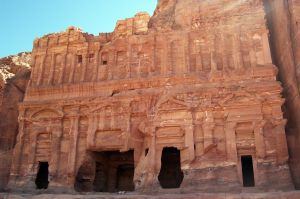 KC: Petra, the ancient ruins in Jordan, is a great example of what can happen with an effort to practice sustainable tourism. We signed an agreement on behalf of the World Heritage Alliance while we were there to help protect this “wonder of the world” from being loved to death. The primary challenge is finding sustainable living and livelihood opportunities for the Bedouins who have lived in the Petra caves for centuries and love their way of life. But they are selling it off by pieces and threatening both the area’s future and their own. The King and Queen of Jordan—she is on our Board—are very committed to this kind of new partnership.
KC: Petra, the ancient ruins in Jordan, is a great example of what can happen with an effort to practice sustainable tourism. We signed an agreement on behalf of the World Heritage Alliance while we were there to help protect this “wonder of the world” from being loved to death. The primary challenge is finding sustainable living and livelihood opportunities for the Bedouins who have lived in the Petra caves for centuries and love their way of life. But they are selling it off by pieces and threatening both the area’s future and their own. The King and Queen of Jordan—she is on our Board—are very committed to this kind of new partnership.
Find out why Peter thinks the Toughest Job in the Middle East is Minister of Tourism – Travel Detective Blog.
MP: My mother defines humility as “remaining teachable.” One of the traits that you seem to epitomize is a genuine curiosity about people and issues. Could you describe a particular encounter or interaction you’ve had while traveling, where someone really transmitted a powerful lesson, one that you were grateful to be open to?
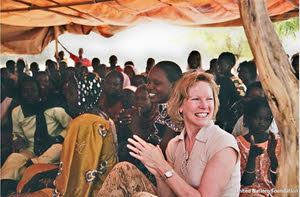 KC: I was privileged to meet Nelson Mandela in 2008, and I will never forget the experience. Almost 90 and frail, he exudes a saintly calm and inner peace that is totally overwhelming and contagious. We were in Ulusaba, a game reserve owned by Richard Branson which he was opening to the Elders, which was founded by Madiba (Ed: an honorary title conferred on Mandela by elders of his clan) and his wife Graca Machel. The African staff were singing and chanting and we were all transported to a higher vision I will never forget.
KC: I was privileged to meet Nelson Mandela in 2008, and I will never forget the experience. Almost 90 and frail, he exudes a saintly calm and inner peace that is totally overwhelming and contagious. We were in Ulusaba, a game reserve owned by Richard Branson which he was opening to the Elders, which was founded by Madiba (Ed: an honorary title conferred on Mandela by elders of his clan) and his wife Graca Machel. The African staff were singing and chanting and we were all transported to a higher vision I will never forget.
MP: When was the first time you traveled alone and was there a moment that defined that experience for you?
More on Solo Travel here, or learn more about African Travel here.
KC: I traveled to Europe alone between my junior and senior year of college and it was the first time I’d really been lonely. I hitchhiked alone for almost a month, and I learned that travel is often more about the trip than the destination.
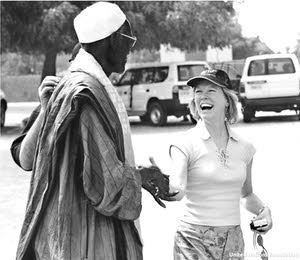 That’s still true today: my husband and I love to ride his BMW motorcycle on long trips that take us through small towns, down “blue highways” and back roads, and to places we’ve never been. We are never disappointed by what we discover.
That’s still true today: my husband and I love to ride his BMW motorcycle on long trips that take us through small towns, down “blue highways” and back roads, and to places we’ve never been. We are never disappointed by what we discover.
MP: I’ve heard you say that growing up in the Midwest, you couldn’t wait to “spread your wings,” shall we say. Can you tell me what you think fueled that desire, and is it still there?
KC: My mother was a frustrated actress—a career she gave up for parenting. I had a burning desire not to miss anything in my life. So I wanted to see and do everything. I couldn’t wait to live somewhere new. I went to Europe to study for a summer during high school and knew I’d always want to be a global citizen. Today I’m glad to be rooted as well as winged.
Get help on helping in your own way in our Voluntourism section.
MP: I would imagine having a job description that involves solving global problems could be a bit overwhelming at times. Do you feel overwhelmed or frustrated at times, and, if so, how do you deal with it?
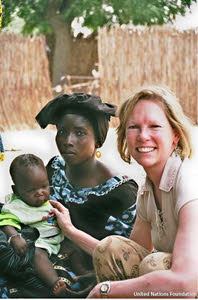 KC: I feel overwhelmed a lot and often unequipped. The problems the Foundation deals with are massive, so we try to figure out what the gaps are or the barriers that we can focus on closing or breaking down. I don’t have an academic background in global development, but bring a sense of communications, politics and coalition-building to the table. So again, it’s all about approaching these massive problems right where we started—with collaboration. I read a lot but I find its best not to try to become an expert as there are plenty of them available to us. My job works best when I am able to help leverage the work of others.
KC: I feel overwhelmed a lot and often unequipped. The problems the Foundation deals with are massive, so we try to figure out what the gaps are or the barriers that we can focus on closing or breaking down. I don’t have an academic background in global development, but bring a sense of communications, politics and coalition-building to the table. So again, it’s all about approaching these massive problems right where we started—with collaboration. I read a lot but I find its best not to try to become an expert as there are plenty of them available to us. My job works best when I am able to help leverage the work of others.
MP: If you had to single out one attribute that you consider the most essential to connecting with other people, what is it?
KC: Listening.
Learn more about the UN Foundation’s programs and how you can participate in the dialogue at www.unfoundation.org.
By Meg Pier for PeterGreenberg.com. Images courtesy of the United Nations Foundation. Visit Meg on the Web at www.viewfromthepier.com. For the complete interview with Kathy Calvin, click here.
Related links on PeterGreenberg.com:
- Managing UNESCO World Heritage Sites – Peer to Pier Interview
- Global Heritage Fund Co-Founder Talks Sustainable Tourism
- Hitesh Mehta – Interview with an Eco-Tourism Pioneer
- Dr. Bernard Salome & Millennium Foundation’s MassiveGood Campaign
- Toughest Job in the Middle East: Minister of Tourism – Travel Detective Blog
- Volunteer Vacations & Disaster Assistance in Haiti, Chile & Beyond
- Voluntourism section












